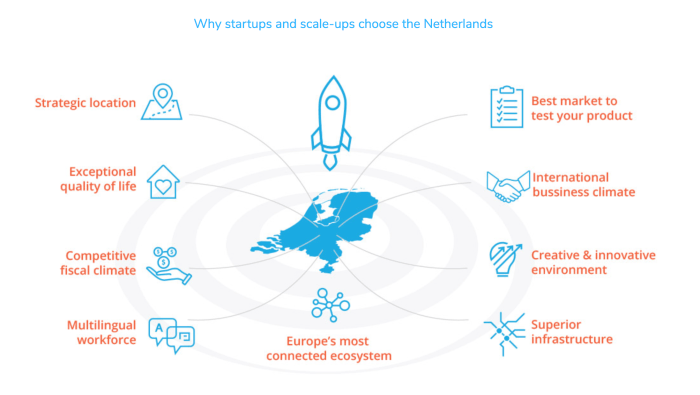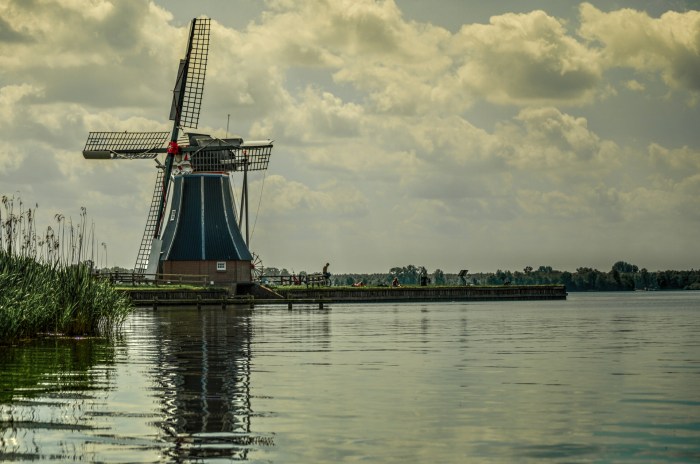Netherlands startup scene is booming but still needs to do more. The Dutch startup ecosystem is thriving, fueled by a strong tech community, government support, and a culture of innovation. From fintech to sustainability, Dutch startups are making waves globally.
However, despite its impressive growth, the Dutch startup scene faces challenges, such as attracting international talent and securing sufficient funding. This blog post explores the factors driving the Dutch startup boom, analyzes the challenges and opportunities, and provides recommendations for further growth.
The Netherlands boasts a unique blend of factors that contribute to its startup scene’s success. Its robust research and development capabilities, combined with a supportive government environment, have fostered a breeding ground for innovative ventures. From companies like Adyen, a global payment platform, to Picnic, a grocery delivery service, Dutch startups are proving their ability to compete on a global stage.
The Dutch Startup Ecosystem: A Booming Landscape: Netherlands Startup Scene Is Booming But Still Needs To Do More

The Netherlands has emerged as a thriving hub for startups, attracting entrepreneurs and investors from around the globe. This dynamic ecosystem is fueled by a confluence of factors, including a robust infrastructure, a supportive government, and a culture that embraces innovation.
Factors Driving Growth
The Netherlands’ startup scene is characterized by several key drivers that contribute to its growth.
- Strong Infrastructure: The country boasts world-class universities, research institutions, and a skilled workforce, providing a fertile ground for innovation and technological advancements. The presence of major corporations like Philips, Unilever, and ING also creates opportunities for startups to collaborate and learn from established players.
- Government Initiatives: The Dutch government actively supports entrepreneurship through various programs and initiatives. The StartupDelta program, for instance, provides funding, mentorship, and access to networks for startups. The government also offers tax incentives and simplified regulations, making it easier for businesses to operate and grow.
- Favorable Investment Climate: The Netherlands has a strong track record of attracting venture capital and private equity investments. Amsterdam, in particular, has become a major European hub for technology investment. The presence of numerous accelerators and incubators, such as Rockstart and Startupbootcamp, further supports the growth of startups.
- Open and Collaborative Culture: The Dutch culture is known for its openness, tolerance, and collaborative spirit. This fosters a welcoming environment for startups and encourages entrepreneurs to share ideas and resources.
Examples of Successful Dutch Startups
The Dutch startup ecosystem has produced a number of successful companies that have made a global impact.
Enhance your insight with the methods and methods of critical review eus ethics guidelines for trustworthy ai.
- Adyen: A leading global payment platform that processes transactions for companies like Netflix, Spotify, and Uber. Adyen’s innovative technology and focus on customer experience have helped it achieve rapid growth and become a major player in the fintech industry.
- Booking.com: One of the world’s largest online travel agencies, offering accommodation, flights, car rentals, and other travel services. Booking.com’s success is attributed to its user-friendly platform, competitive pricing, and extensive network of partners.
- TomTom: A pioneer in navigation technology, TomTom’s GPS devices and mapping software have become ubiquitous worldwide. The company has expanded its product portfolio to include traffic information, fleet management, and other services.
- Coolblue: A leading online retailer in the Netherlands, specializing in electronics and home appliances. Coolblue’s focus on customer service, fast delivery, and competitive pricing has made it a popular choice for consumers.
Government Funding and Support
The Dutch government plays a crucial role in fostering innovation through various funding programs and initiatives.
- StartupDelta: A national program aimed at supporting startups and scaling up their businesses. StartupDelta provides funding, mentorship, and access to networks for startups.
- R&D Tax Credits: The government offers tax credits for companies that invest in research and development, encouraging innovation and technological advancements.
- Venture Capital Funds: The government provides financial support to venture capital funds, making it easier for startups to access funding.
- Incubators and Accelerators: The government supports the establishment and operation of incubators and accelerators, providing startups with mentorship, resources, and networking opportunities.
Challenges and Opportunities
The Dutch startup ecosystem is experiencing rapid growth, but its journey to becoming a global powerhouse is not without its challenges. While the Netherlands boasts a strong foundation for innovation, navigating the path to sustained growth requires addressing specific hurdles and leveraging existing strengths.
Talent Acquisition
Attracting and retaining top talent is a crucial challenge for Dutch startups. While the Netherlands has a highly skilled workforce, competition for talent is fierce, particularly in the tech sector. The country’s relatively small size and high cost of living can make it difficult to attract and retain international talent.
- The Dutch government is actively working to address this challenge by investing in education and training programs, promoting immigration, and fostering collaboration between universities and startups.
- Initiatives like the “Startup Delta” program aim to attract international talent by highlighting the Netherlands’ unique advantages, such as its strong research and development capabilities, its vibrant startup community, and its high quality of life.
Access to Funding
Securing funding is another significant challenge for Dutch startups. While the Netherlands has a growing venture capital market, it remains relatively small compared to other European countries. Startups often face difficulties accessing seed funding and Series A financing.
- The Dutch government has introduced various programs to support startups, including tax breaks, grants, and loan schemes.
- The European Union’s Horizon Europe program provides funding for research and innovation projects, which can benefit Dutch startups.
International Expansion
Expanding internationally is essential for Dutch startups to achieve significant growth. However, navigating different markets, cultures, and regulations can be challenging.
- The Netherlands has a strong reputation for international business, which can be an advantage for Dutch startups looking to expand abroad.
- The country’s strategic location in Europe provides easy access to major markets.
- The Dutch government offers support to startups seeking to expand internationally, including market research, trade missions, and networking opportunities.
Opportunities, Netherlands startup scene is booming but still needs to do more
Despite the challenges, the Dutch startup ecosystem offers numerous opportunities for growth.
Research and Development
The Netherlands has a strong tradition of research and development, with world-class universities and research institutions. This provides a fertile ground for innovation and technology development.
- Dutch universities are actively collaborating with startups, providing access to cutting-edge research, expertise, and talent.
- The government supports research and development through various programs, including tax breaks and grants.
Thriving Tech Community
The Netherlands has a vibrant and supportive tech community, with numerous accelerators, incubators, and co-working spaces. This provides a collaborative environment for startups to connect, learn, and grow.
- The Dutch tech community is known for its collaborative spirit, with startups often sharing knowledge and resources.
- The Netherlands hosts numerous tech events and conferences, providing opportunities for networking and learning.
Comparison to Other European Countries
The Dutch startup scene is often compared to other European countries, such as the UK, Germany, and France.
- The Netherlands has a strong focus on sustainability and social impact, which is reflected in the types of startups that are emerging.
- The country’s relatively small size can be both a strength and a weakness. While it can make it easier to build relationships and collaborate, it can also limit the scale of startups.
- The Netherlands is known for its high quality of life, which can be a major attraction for talent and investors.
Key Sectors Driving Innovation

The Dutch startup scene is a vibrant ecosystem with a strong focus on innovation. While the country boasts a diverse range of startups, certain sectors are driving the majority of the innovation and economic growth. This section delves into the most prominent startup sectors in the Netherlands, highlighting their key trends and influential startups.
Key Startup Sectors in the Netherlands
The Dutch startup ecosystem is diverse, with startups emerging in various sectors. Here’s a table showcasing some of the most prominent startup sectors in the Netherlands, along with notable startups and key trends.
| Sector Name | Prominent Startups | Key Trends |
|---|---|---|
| Fintech | Adyen, Bunq, Mollie, Moneybird | Open banking, embedded finance, digital payments, and regulatory technology (RegTech). |
| AgriTech | Cropio, Plant-e, Wageningen UR | Precision agriculture, vertical farming, sustainable agriculture, and food security. |
| HealthTech | HealthXL, Philips, Medtronic | Digital health, telemedicine, personalized medicine, and medical device innovation. |
| CleanTech | Solarcentury, WindWorks, Greenpeace | Renewable energy, energy efficiency, and sustainable technologies. |
| E-commerce | Bol.com, Coolblue, Wehkamp | Cross-border e-commerce, omnichannel retail, and customer experience optimization. |
Fostering a Sustainable Future

The Dutch startup ecosystem is not only known for its innovation and entrepreneurial spirit but also for its growing commitment to sustainability and social impact. Many Dutch startups are actively tackling environmental challenges, promoting social good, and developing ethical business practices.
This commitment is driven by a combination of factors, including the Netherlands’ strong tradition of social responsibility, the increasing awareness of environmental issues, and the growing demand for sustainable products and services.
The Role of Sustainability and Social Impact in the Dutch Startup Landscape
Sustainability and social impact are becoming increasingly important factors for Dutch startups. This is reflected in the growing number of startups focusing on these areas, the increasing availability of funding and support for sustainable ventures, and the rising demand for ethical products and services from consumers.
Building a Stronger Future
The Dutch startup scene is experiencing rapid growth, but to reach its full potential, it needs to address existing challenges and implement strategic initiatives. This section Artikels a roadmap for the Dutch startup scene to overcome these hurdles and achieve further growth, focusing on attracting international talent, enhancing funding opportunities, and promoting collaboration between startups and established businesses.
Attracting International Talent
The Dutch startup scene is thriving, but it faces a growing need for skilled talent. To attract and retain international talent, the Netherlands should prioritize initiatives that enhance its appeal as a destination for global talent.
- Streamlining Immigration Processes:Simplify visa procedures and create a welcoming environment for international entrepreneurs and workers. Streamlining the immigration process for highly skilled professionals can attract more international talent.
- Promoting International Collaboration:Encourage partnerships between Dutch universities and international research institutions to foster knowledge exchange and collaboration. Partnerships can attract researchers and entrepreneurs to the Netherlands.
- Enhancing English Language Proficiency:Expand English language programs and support initiatives that promote English proficiency in the workplace. English is the global language of business, making it crucial for attracting international talent.
Enhancing Funding Opportunities
Access to funding is crucial for startups to grow and scale. The Netherlands can enhance its funding ecosystem by:
- Expanding Venture Capital Investments:Encourage the growth of venture capital firms and angel investors in the Netherlands to provide startups with access to funding. Venture capital firms play a vital role in providing funding and expertise to startups.
- Creating More Government Grants:Increase government grants and subsidies specifically designed for startups in high-growth sectors. Government support can provide crucial seed funding for startups.
- Promoting Crowdfunding Platforms:Support the development of crowdfunding platforms to allow startups to raise capital from a broader range of investors. Crowdfunding platforms can democratize access to capital for startups.
Promoting Collaboration Between Startups and Established Businesses
Collaboration between startups and established businesses can create win-win scenarios, fostering innovation and driving economic growth.
- Creating Mentorship Programs:Establish programs that connect startups with experienced mentors from established businesses to provide guidance and support. Mentorship programs can offer valuable insights and connections to startups.
- Encouraging Corporate Innovation Programs:Promote initiatives that encourage established businesses to collaborate with startups through innovation challenges and accelerator programs. Corporate innovation programs can help established businesses tap into the creativity of startups.
- Facilitating Open Innovation Platforms:Develop online platforms that connect startups with established businesses, enabling them to share ideas, collaborate on projects, and explore potential partnerships. Open innovation platforms can create a dynamic ecosystem for collaboration.


